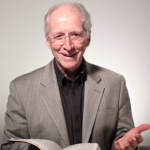 Roger R. Nicole
Roger R. Nicole
(original source here)
Editor’s note: The 2015-16 academic year began a series of observances at Reformed Theological Seminary in commemoration of its jubilee. We would be remiss if we failed also to note that 2015 is the centennial of the birth of Roger Nicole, who joined the faculty at RTS Orlando in 1989 and served faithfully for two decades. This essay originates as an address delivered at the 1974 Philadelphia Conference on Reformed Theology and was subsequently published in Tenth: A Journal of Tenth Presbyterian Church.
The five points of Calvinism come to us today in a form that is quite traditional: total depravity, unconditional election, limited atonement, irresistible grace and perseverance of the saints. But we are not to think that this is the only form the doctrines of grace can take or that the phrases themselves are unalterable.
The advantage of this particular formulation is that when you take the first letter of each of those points and read it from top to bottom you find the word “tulip,” and so have an acrostic. The tulip is a beautiful flower marvelously cultivated in the Netherlands, and since there are many Calvinists in the Netherlands and many flower-loving people, it seems to be a delightful arrangement to organize these doctrines in terms of the letters of this word. However, I would like to consider the nature of the points and suggest certain re-wordings which, in my judgment, may prevent misunderstandings.
Pervasive Evil
The first point is “total depravity.” The purpose of this point is to emphasize that no expectation can be entertained from man with respect to ability to please God or even to come to him in salvation unless God moves him to it. Thus, the purpose is to turn away the eyes from man in his action and ability and instead direct the eyes to God and his sovereign action. The advantage of expressing this truth in this way is that we emphasize the fundamental and pervasive character of the evil in man.
However, the terms that are used are somewhat misleading. I find that invariably, after having said “total depravity,” the staunchest Calvinists find it important to qualify precisely what they mean. They add, “But we don’t mean to say by this that man is quite as bad as he could be.” Practically everybody who says “total depravity” or “total inability” has to qualify this at once. Obviously, people who seek to know what Calvinism is ought to make it their business, not only to go by certain titles, but also to examine what is being said under those titles. But since those words are used repeatedly we cannot blame them too much for having taken them at face value. Nor can we blame them when, thinking that somehow Calvinists believe that every man is as evil as he can be, and finding situations where men seem praiseworthy, these people point to certain virtues and say, “How can you hold to your Calvinism in the presence of this?” Perhaps it would be wiser to use another form of language that would be calculated to emphasize the indispensable character of this divine grace and that would not need so quickly to have a qualification.
May I suggest that what the Calvinist wishes to say when he speaks of total depravity is that evil is at the very heart and root of man. It is at the very foundation, at the deepest level of human life. This evil does not corrupt merely one or two particular avenues of the life of man but is pervasive in that it spreads into all aspects of the life of man. It darkens his mind, corrupts his feelings, warps his will, moves his affections in wrong directions, blinds his conscience, burdens his subconscious, and afflicts his body. There is hardly any way in which man is called upon to express himself in which, in some way, the damaging character of evil does not manifest itself. Evil is like a root cancer that extends in all directions within the organism to cause its dastardly effects.
How shall we express this? Well, I am not too happy about my substitutions, but I would like to suggest that the term be “radical depravity” or “pervasive depravity” or, if you want to have a somewhat longer approach, to say “radical and pervasive depravity.” This is a little less sweeping than “total” and, in that sense, a little closer to what we really want to assert.
Divine Initiative
The second point is “unconditional election.” The emphasis here is upon the fact that it is God who takes the initiative. There is no previous merit or condition in the creature, either present or foreseen, which determines the divine choice. This is the key to what is in view. The disadvantage to this formulation is twofold. In the first place, it is not sufficiently comprehensive, for it suggests that the only thing that God does is to elect people to be saved and that, therefore, there is no relationship of God to those who are lost. But election involves not only the taking of some to be saved; it also involves the bypassing of the remainder of mankind and the just reprobation of them in view of their sins. So just to talk of election is not enough. We should also recognize preterition, the bypassing of those who are not to be saved. Moreover, the term “unconditional” might be misconstrued to suggest that God has no interest in the condition of those whom he chooses to make his redeemed people. It suggests that God is not concerned about what we are, what we become, and how we relate ourselves to his will. If the point is that God does not ground his choice in the fact that those who are elected are better or worse than others, it is correct. But if it suggests that God does not care about the condition of those whom he has chosen to save, it is wholly incorrect. For the Scripture makes it very specific that we are elected “unto good works, which God hath before ordained that we should walk in them” (Eph. 2:10).
What we need to recognize here is that the sovereign initiative in salvation is with God. It is not with man. It is not by virtue of something that God has foreseen in a man – some preexisting condition which is the source or root of the elective purpose of God – that God saves him. God in his own sovereign wisdom chooses, for reasons that are sufficient unto himself, those who shall be saved. We may, therefore, much better speak of “sovereign election” or the “preterition of God.”
Definite Atonement
Then comes the third point, which is sometimes called “limited atonement.” This, I think, is a complete misnomer. The other points I can live with, but “limited atonement” I cannot live with, for this is a total misrepresentation of what we mean to say.
The purpose of using this expression is to say that the atonement is not universal (in the sense of Christ having died for every member of the race in the same sense in which he died for those who will be redeemed). Therefore, the purpose of the atonement is restricted to the elect and is not spread to the universality of mankind.
Some limit it in breadth; that is, they say the Lord Jesus Christ died for the redeemed and that he sees to it that the redeemed are therefore saved. For them there is a certain group of mankind, a particular group, which is the special object of the redemptive love and substitutionary work of Jesus Christ and toward which Christ sees to it that his work is effective. While the remainder of mankind may gain some benefits from the work of Christ, they are, however, not encompassed in the same way in his design as were those whom the Father gave him. This is one way of limiting it.
Other people say that Christ died for everybody in the same way, but they must acknowledge that some of the people for whom Christ died are at the end lost. So for these the death of Christ does not, in fact, ensure the salvation of those for whom he died. The effect is to limit the atonement in depth. The atonement is ineffective. It does not secure the salvation of the people for whom it is intended. For these, the will of God and the redemptive love of Jesus Christ are frustrated by the resistance and wicked will of men who resist him and do not accept his grace. In addition, salvation really consists of the work of Christ, plus the acceptance or non-resistance of some ingredient of one kind or another that some people add, and it is this ingredient which really constitutes the difference between being saved and being lost. No one who says that at the end there will be some people saved and other people lost can really in honesty speak of an unlimited atonement.
For these reasons I, for one, am not happy to go under the banner of a limited atonement, as though Calvinists and myself were ones who wickedly emasculate and mutilate the great scope and beauty of the love and redemption of Jesus Christ. For it is not really a question of limits. It is a question of purpose. How should we phrase it therefore?
We ought rather to talk about “definite atonement.” We ought to say that there was a definite purpose of Christ in offering himself. The substitution was not a blanket substitution. It was a substitution that was oriented specifically to the purpose for which he came into this world, namely, to save and redeem those whom the Father has given him. Another term that is appropriate, although perhaps it is less precise than “definite atonement,” is “particular redemption.” For, the redemption of Christ is a particular one which accomplished what it purposed. The only alternative is that Christ redeemed no one in particular.
If we change the language in this way I think we put ourselves away from being the ones who seem to be in the business of restricting the scope of the love of Christ. If I say that my position is that of limited atonement, my opponent will say, “You believe in limited atonement, but I believe in unlimited atonement.” He seems to be the one who exalts the grace of God. But see what happens when we use my words. I say, “I believe in a definite atonement.” What can my opponent say? “1 believe in an indefinite atonement”? If I use the old language, I have no opportunity to do anything except protest. If I use the new language, I do not put myself at a psychological disadvantage from the start. Incidentally, the term “definite atonement” you will find in writers such as John Owen and William Cunningham of Scotland. So let us abandon the expression “limited atonement,” which disfigures the Calvinistic doctrine of grace in the work of Christ.
Effectual Grace
The fourth point is “irresistible grace.” The emphasis here is upon the fact that God accomplishes his designs, so that the saving grace of God cannot be resisted unto perdition. But a misunderstanding may also arise from this phrase; for it may suggest that a man may resist to the very end and that God will nevertheless press him willy-nilly, kicking and screaming, into the Kingdom. This is not the case. The grace of God does not function against our wills but is rather a grace which overcomes the resistance of our wills. God the Holy Spirit is able to accomplish this.
You say, “How can God the Holy Spirit accomplish this without violating free will and making us into puppets?” I don’t know how he can do it but that is what he does. I am not concerned about God’s modes of operation, and I am quite ready to see that he may well have a good number that I do not know about and that I am not able to explore. What I do know is that when there is resistance God comes in with his mighty grace and subdues that resistance. He makes no one come against his will, but he makes them willing to come. He does not do violence to the will of the creature, but he gently subdues and overcomes human resistance so men will gladly respond to him and come in repentance and faith. We ought not to give the impression that somehow God forces himself upon his creatures so that the gospel is crammed down their throats, as it were. In the case of adults (those who have reached the age of accountability) it is always in keeping with the willingness of the individual that the response to grace comes forth. This is surely apparent in the case of the Apostle Paul, for whom God had perhaps made what might be called the maximum effort to bring him in. He resisted, but God overcame his resistance. The result is that Paul was brought willingly and happily into the fold of the grace of God.
What we mean here is not “irresistible”—it gives the impression that man continues to resist—but “effectual.” That is, the grace of God actually accomplishes what he intends it to accomplish.
Perseverance with His Saints
The last point is called “the perseverance of the saints,” and the emphasis is upon the truth that those who have been won by the grace of God will not lose out but will be preserved by God’s grace to ultimate salvation. It means that it is not possible for one who is truly regenerate so to fall out of the reach of divine grace as to lose salvation altogether and finally be lost.
The advantage of this formulation is that there is, indeed, a human activity in this process. The saints are active. They are not just passive. In a true sense they are called upon to persevere. But there is a devastating weakness in this formulation in that it suggests that the key to this perseverance is the activity of the saints. It suggests that they persevere because they are strong, that they are finally saved because they show that kind of stability and consistency which prevents them from turning back into their original wickedness. This is never the case. The key to perseverance is the preservation by God of his saints, that is, the stability of his purpose and the fixity of his design. What is to be in view here is not so much the perseverance of those who are saved but the perseverance of God with the sinners whom he has gloriously transformed and whom he assists to the end. We ought to talk about “God’s perseverance with his saints.” That is the thing that we need to emphasize.
A New Acrostic?
We now need to review our terms—“radical depravity,” “sovereign election and preterition,” “definite atonement,” “effectual grace,” and “the perseverance of God with his saints.” Those are the terms I suggested. Unfortunately, the terms do not provide acrostics in English, French, German, Latin, or any other language I know of. So we have lost our “tulip,” that beautiful mnemonic device to remember these five points in a simple manner. Well, I think it may be worthwhile to lose it, if those other terms mislead people as to what it is we actually hold. We certainly don’t want to sell our birthright, which is the truth, for a mess of pottage, which is an acrostic. If that is what has to be done, let it be done.
On the other hand, I do not want to finish altogether on this note. So I would like to suggest to you that there is a way in which we ought to unite the five points; for in a very special sense we ought to recognize that the five points of Calvinism are, in reality, not five separate doctrines that we assert almost as disjointed elements, but rather the articulation of one point which is the grace of God. Total depravity we may call “indispensable grace.” It is the truth that without God’s grace we can do nothing because we are so evil. Election, called in Scripture the election of grace, may well be called “differentiating grace” or “sovereign grace.” Definite atonement is “providing grace,” for it refers to that grace by which God has established a basis for salvation. The fourth point is “effectual” or “efficacious grace.” Perseverance of the saints may be called “indefectible grace,” grace that will never fail us. In this way we can see how the points simply formulate what Scripture presents to us concerning God’s grace.
If you want to, you can make an acrostic that will read “gospel.” The g would be “grace”; the o, total depravity, would be “obligatory grace”; the s would be “sovereign grace”; the p, corresponding to definite atonement, would be “provision-making grace”; the e is “effectual grace”; finally, the l would be “lasting grace.” I do not like this as well as I like my other terms, so I present it with some diffidence. But if you are hung up on an acrostic, use it. At any rate, get something that has more meaning than “tulip.”
Even better, let us go to the heart of the gospel and say, “Calvinism is the gospel,” and then spell it out. This is what the Reformed position was all about, after all. Sola gratia! By grace alone! That is what we are talking about. The five points of Calvinism merely conjoin to this. Moreover, we do not even have to go to the Reformation, we can go directly to the Scripture.
Here is a text: Jonah 2:9. It reads, “Salvation is of the Lord.” And, in the New Scofield Bible, which I will even venture to quote for once, there is a beautiful little note at that place which says, “The theme of the Scripture.” That is exactly it. Salvation is of the Lord! That is the theme of the Scripture, and the five points of Calvinism.
 “Now may the God of peace himself sanctify you completely, and may your whole spirit and soul and body be kept blameless at the coming of our Lord Jesus Christ. He who calls you is faithful; he will surely do it.” – 1 Thess. 5:23-24
“Now may the God of peace himself sanctify you completely, and may your whole spirit and soul and body be kept blameless at the coming of our Lord Jesus Christ. He who calls you is faithful; he will surely do it.” – 1 Thess. 5:23-24 
 THE FIVE SOLAS – Standing Together, Alone by John Samson
THE FIVE SOLAS – Standing Together, Alone by John Samson This excerpt is adapted from Foundations of Grace by Steven J. Lawson.
This excerpt is adapted from Foundations of Grace by Steven J. Lawson. “If there was a drawn sword pointed to my breast and Christ at the other end of it, if I had no other way to be at Him and with Him, I would run myself upon it to be at Him and with Him forever: for He is my life, my heaven, and my all.” – Rev. Thomas Hog
“If there was a drawn sword pointed to my breast and Christ at the other end of it, if I had no other way to be at Him and with Him, I would run myself upon it to be at Him and with Him forever: for He is my life, my heaven, and my all.” – Rev. Thomas Hog Article by Dr. John Piper (original source
Article by Dr. John Piper (original source  Roger R. Nicole
Roger R. Nicole